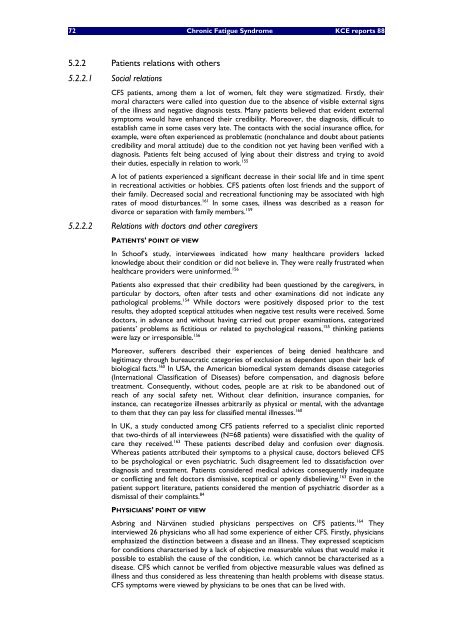Chronisch Vermoeidheidssyndroom: diagnose, behandeling en ...
Chronisch Vermoeidheidssyndroom: diagnose, behandeling en ...
Chronisch Vermoeidheidssyndroom: diagnose, behandeling en ...
Create successful ePaper yourself
Turn your PDF publications into a flip-book with our unique Google optimized e-Paper software.
72 Chronic Fatigue Syndrome KCE reports 88<br />
5.2.2 Pati<strong>en</strong>ts relations with others<br />
5.2.2.1 Social relations<br />
CFS pati<strong>en</strong>ts, among them a lot of wom<strong>en</strong>, felt they were stigmatized. Firstly, their<br />
moral characters were called into question due to the abs<strong>en</strong>ce of visible external signs<br />
of the illness and negative diagnosis tests. Many pati<strong>en</strong>ts believed that evid<strong>en</strong>t external<br />
symptoms would have <strong>en</strong>hanced their credibility. Moreover, the diagnosis, difficult to<br />
establish came in some cases very late. The contacts with the social insurance office, for<br />
example, were oft<strong>en</strong> experi<strong>en</strong>ced as problematic (nonchalance and doubt about pati<strong>en</strong>ts<br />
credibility and moral attitude) due to the condition not yet having be<strong>en</strong> verified with a<br />
diagnosis. Pati<strong>en</strong>ts felt being accused of lying about their distress and trying to avoid<br />
their duties, especially in relation to work. 155<br />
A lot of pati<strong>en</strong>ts experi<strong>en</strong>ced a significant decrease in their social life and in time sp<strong>en</strong>t<br />
in recreational activities or hobbies. CFS pati<strong>en</strong>ts oft<strong>en</strong> lost fri<strong>en</strong>ds and the support of<br />
their family. Decreased social and recreational functioning may be associated with high<br />
rates of mood disturbances. 161 In some cases, illness was described as a reason for<br />
divorce or separation with family members. 159<br />
5.2.2.2 Relations with doctors and other caregivers<br />
PATIENTS’ POINT OF VIEW<br />
In Schoof’s study, interviewees indicated how many healthcare providers lacked<br />
knowledge about their condition or did not believe in. They were really frustrated wh<strong>en</strong><br />
healthcare providers were uninformed. 156<br />
Pati<strong>en</strong>ts also expressed that their credibility had be<strong>en</strong> questioned by the caregivers, in<br />
particular by doctors, oft<strong>en</strong> after tests and other examinations did not indicate any<br />
pathological problems. 154 While doctors were positively disposed prior to the test<br />
results, they adopted sceptical attitudes wh<strong>en</strong> negative test results were received. Some<br />
doctors, in advance and without having carried out proper examinations, categorized<br />
pati<strong>en</strong>ts’ problems as fictitious or related to psychological reasons, 155 thinking pati<strong>en</strong>ts<br />
were lazy or irresponsible. 156<br />
Moreover, sufferers described their experi<strong>en</strong>ces of being d<strong>en</strong>ied healthcare and<br />
legitimacy through bureaucratic categories of exclusion as dep<strong>en</strong>d<strong>en</strong>t upon their lack of<br />
biological facts. 160 In USA, the American biomedical system demands disease categories<br />
(International Classification of Diseases) before comp<strong>en</strong>sation, and diagnosis before<br />
treatm<strong>en</strong>t. Consequ<strong>en</strong>tly, without codes, people are at risk to be abandoned out of<br />
reach of any social safety net. Without clear definition, insurance companies, for<br />
instance, can recategorize illnesses arbitrarily as physical or m<strong>en</strong>tal, with the advantage<br />
to them that they can pay less for classified m<strong>en</strong>tal illnesses. 160<br />
In UK, a study conducted among CFS pati<strong>en</strong>ts referred to a specialist clinic reported<br />
that two-thirds of all interviewees (N=68 pati<strong>en</strong>ts) were dissatisfied with the quality of<br />
care they received. 163 These pati<strong>en</strong>ts described delay and confusion over diagnosis.<br />
Whereas pati<strong>en</strong>ts attributed their symptoms to a physical cause, doctors believed CFS<br />
to be psychological or ev<strong>en</strong> psychiatric. Such disagreem<strong>en</strong>t led to dissatisfaction over<br />
diagnosis and treatm<strong>en</strong>t. Pati<strong>en</strong>ts considered medical advices consequ<strong>en</strong>tly inadequate<br />
or conflicting and felt doctors dismissive, sceptical or op<strong>en</strong>ly disbelieving. 163 Ev<strong>en</strong> in the<br />
pati<strong>en</strong>t support literature, pati<strong>en</strong>ts considered the m<strong>en</strong>tion of psychiatric disorder as a<br />
dismissal of their complaints. 84<br />
PHYSICIANS’ POINT OF VIEW<br />
Asbring and Närvän<strong>en</strong> studied physicians perspectives on CFS pati<strong>en</strong>ts. 164 They<br />
interviewed 26 physicians who all had some experi<strong>en</strong>ce of either CFS. Firstly, physicians<br />
emphasized the distinction betwe<strong>en</strong> a disease and an illness. They expressed scepticism<br />
for conditions characterised by a lack of objective measurable values that would make it<br />
possible to establish the cause of the condition, i.e. which cannot be characterised as a<br />
disease. CFS which cannot be verified from objective measurable values was defined as<br />
illness and thus considered as less threat<strong>en</strong>ing than health problems with disease status.<br />
CFS symptoms were viewed by physicians to be ones that can be lived with.

















